Marine Le Pen’s Voters
This is where the Front National is on the rise in France.

Le Pen does not popular in the France’s cosmopolitan cities, places at ease with globalisation, but she does have a majority in places in the Southern and Northern France. According to The Economist, in between 2006 and 2011, the number of jobs increased on average by 5%, in 13 big French cities: Lyon, Marseille, Toulouse, Lille, Bordeaux, Nantes, Nice, Strasbourg, Rennes, Grenoble, Rouen, Montpellier, and Toulon. However, in France as a whole, the jobs were lost.
The Front National’s gains in working-class areas have been most important in right-wing working-class areas or left-wing working-class areas where the Socialist Party (SP) has tended to be the dominant party. This areas were previously dominated by the left-wing parties, including the French Communist Party (PCF). In Calais, for example, the FN’s new working-class bases have historically been municipalities where the SP dominated politics. Large numbers of immigrant and jobs are the core factors why FN could sweep the area where used to be dominated by left-wingers.
Who is voting for Mélenchon?
I found the Ifop’s study on the Mélenchon phenomenon, I think they made it very details and gives us a few answers. The data was made for the latest election and there is not a 2017 data yet, but I think it would not give a different result that much. Besides, the documents were written in French and my French is not that fluent, so it took me a time to translate the nine pages of analysis. Here we go:
In term of genders, Mélenchon’s electorate is more masculine than feminine and is heterogeneous in its age, appealing to both to young voters (18-24) and older voters (50-64).
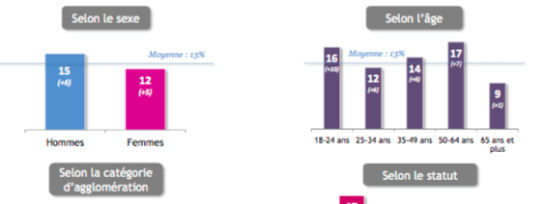
He seems to have the most points with the most points with the youngest voters. These young voters likely come from the Socialist Party supporters (or perhaps another left-wing parties, Democratic Movement and its leader, François Bayrou), but some might also be drawn from the “aphatetic” voters who were motivated by Mélenchon’s campaign.
Let see what the Ifop offers on his voters by socio-professional category, as of 2012:
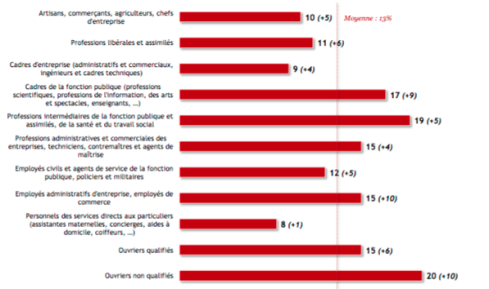
I transformed the data into a table form, with English translation, it gives:
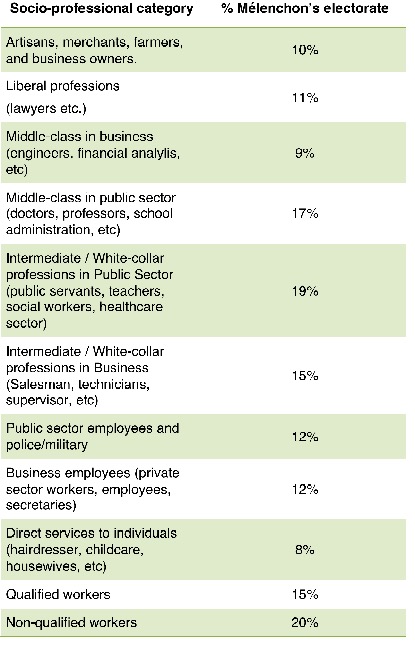
Mélenchon is catching a very diverse electorate, performing best in the most liberal professions and not doing quite well in the right-leaning categories. The core of Mélenchon’s base is made up of public servants. He appeals to a middle-class electorate. As you can see in the above table, he performs very strongly with professionals and middle-level managerial types in the public sector, a category which includes teachers, social workers, healthcare workers, professors, school administrators, employees in states enterprises or similar professions. If you compare this to Marine Le Pen’s voters, of course they are concerned by social issues like these, but her electorate is more concerned by issues such as immigration or criminality.
Macron, your surge is good but you’ve got to be worried about this
Macron will likely to move to the second round of election. He is projected to win about 62% of the votes over Le Pen, or 73% if Fillon could survive in the first round. However, this may not be a good news for Macron and this is where he needs to do a political manoeuvre to fix this situation:

The above table shows how many parties supporter would vote for Macron over Le Pen in the second round election. It can be seen Macron may have secured the centre to centre-left wings, but he could lost almost 50 percent of the votes from the centre-right wing like Les Républicains which few percent of their constituent will likely to move to Front National. By the way, Le Pen constituents in the second round will also likely from the Far-right and the Far-left supporters (Communist Party, Feminist Party, etc.).
Another worst part is:
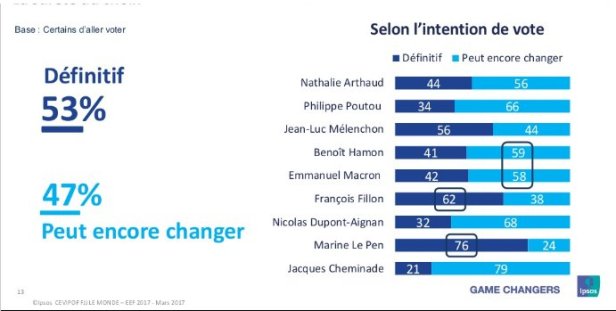
It indicates that there are only 42 percent of Macron’s supporters will definitely vote for him in both first, while the 58 percent could change their minds at anytime. This may not sound good at all. However, the good thing is, Macron’s constituent is largely certain enough to vote in the second round.
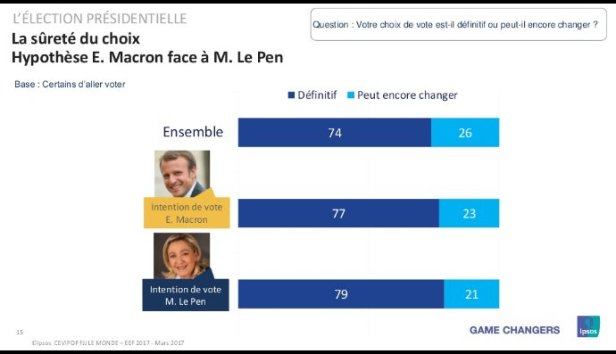
How certain the constituents are for voting their candidates?
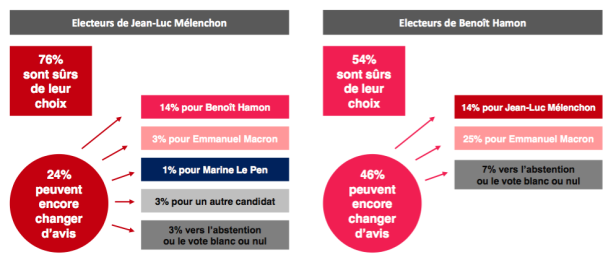
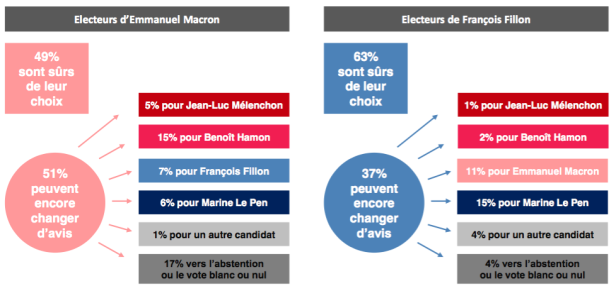

Mélenchon is in pretty much solid conditions with his voters, so is Le Pen and Fillon. While Macron and Hamon will have to work harder in their following campaigns. But I’m sure the first presidential debate will give much more influence to the upcoming opinion polls.
Will the Front Républicain work this time?
In France, Front Républicain is an alliance that was established since the beginning of Fifth French Republic to counter influence from the radical right, in this case, Front National, to gain more voters in the run-off election. Somehow, when the voters have to choose between the far-right and other political party, a large number of voters will choose to vote against the far-right candidate. It proved in 2002 French Presidential Electon. Jacques Chirac, an incumbent president, won the election in a landslide against Jean-Marie Le Pen with 82 percent.
But this is not the 2002 anymore. The situation could change. At the one hand, Front Républicain will favour whoever Le Pen will face in the run-off. The topics that brought in this election are different. The voters are not coming, majority speaking, from the 1930s and 1940s generation anymore. Why do I say this? There was an emotional connection involved in 2002 election. Jean-Marie Le Pen was widely known as a xenophobia, racist, and an anti-semitic. The 30s and 40s generation had felt what it was like living under the Nazism, where they had to see their family members and friends had to be killed by the tyrannies. Great majority of voters today have no memories of World War I and World War II. They, even I, probably do not understand the negative consequences of trade wars and extreme nationalist positions. On top of that, I’m sure the Front Républicain alliance will still work anyhow.
Final say
My personal opinion: Let’s put it this way. France has 2 rounds in the election. Once Marine Le Pen wins the first round, people will wake up and that, she will lose in the final round regardless of whoever she will face in the run-off.
But, After Trump’s election, everything that was unimaginable seems to be imaginable. Both Donald Trump election and Brexit are unexpected reactions. There is tendency toward far-right movements and populism that goes in favor of Marine Le Pen. Although France has always been very protective and reluctant toward the extreme right party since the end of World War II. But times are changing. We can not rule out this possibility.
The most likely situation as of now seems to be a duel between Emmanuel Macron and Marine Le Pen.
I will not tell you about my own personal political preference here. I’m trying to be neutral and just sharing you the opinions according to the facts. The polls are telling that in case of a duel then Emmanuel Macron will win over Marine Le Pen easily (60% vs 40%). Still I doubt about such polls for two reasons :
- There is a bias concerning extreme rights votes in polls, because people are ashamed to claim publically such votes.
- Important reason which makes the difference is political experience
This is what matters most in these political fights and in this aspect Macron is having huge disadvantage with Le Pen. Macron is very young (39) and although brillant and smart he has been really in politic since only 5 years (2012). Marine Le Pen has been around in public life since 15 years (2002) so she is much much more experienced. But, so is Donald Trump, he has never even hold public offices, yet manage to win over the 30-years experienced politician like Hillary Clinton. Will people look for the experience? Yes, but there are also many number of factors that they will consider in this election, rather than years of service in politics.
Once again, I’m not trying to favour anyone in this election. But, keep in mind about the differences between the US and French electoral systems: France requires a majority-win and includes a second voting round to assure it. If Trump had run in such a system he never would have gotten the Presidency. Even if Le Pen wins the presidency, she will be constrained by the National Assembly and the Senate. Front National will definitely not get a majority seat, which will limit the damage that she can do.
There will be three presidential debates (one will be held today, local time) and the election is still a month away. There are a lot of possibilities that may occur in the future that can change the scenarios of this election.
